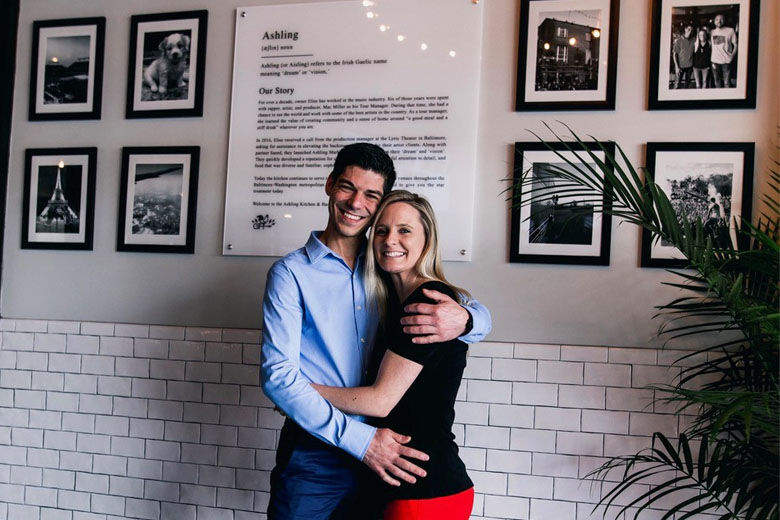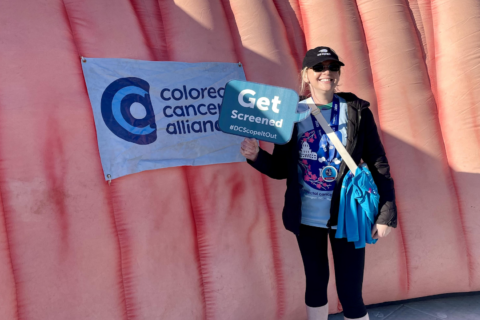
For restaurant owners everywhere, it has been an incredibly difficult year, requiring creative thinking and maybe even throwing the traditional business model they worked so hard on in the trash.
But surviving 2020 has taken on a whole new meaning for Saeed Ashrafzadeh and his fiancé Elise Letavish, who own Ashling Kitchen and Bar in Crofton, Maryland. About a month and a half ago, Letavish was diagnosed with breast cancer.
The couple opened its restaurant in the spring of 2019, and it quickly became a popular spot in the community. The restaurant was born from the couple’s catering business, which had made its mark working concert venues around the region.
Their success in catering reached the point where they needed a commercial-sized kitchen — and they realized a restaurant could provide the space as well as enough work to keep kitchen staff busy, even when there wasn’t a show scheduled somewhere.
When the pandemic arrived, the catering side of the company, once its biggest moneymaker, took the biggest hit at first, since concerts and theaters were shuttered instantly. Ashrafzadeh said they were on the hook for about $25,000 in food for a weekend of performances that never happened.
Then came the restrictions on indoor dining. The restaurant took a hit, but carryout has helped, Ashrafzadeh said.
“The community has really stepped up,” he said. “That’s the impressive thing. I think what this has done is really brought a sense of community together for people and bringing everyone closer together to understand that there are businesses in desperate need of help.”
The hug that changed everything
But the coronavirus pandemic would be far from the only challenge life would throw in the couple’s way.
It was a hug that changed everything.
Ashrafzadeh said he went to give Letavish a big hug when she experienced unusual pain. That led to a trip this fall to the doctor, who ran some tests. The results came back while the couple was vacationing with Letavish’s family: Breast cancer.
“The balancing act on that is the hardest,” said Ashrafzadeh. “This isn’t just breast cancer or cancer for anyone in a normal environment. This is having cancer in an environment where if you’re exposed … it’s a risk of death. The doctors really put you on house lockdown.”
For now, he said he tries to get as much work done around the restaurant as he can without being around too many other people, while employees lean in and help with some of the work Letavish is no longer able to do. She’s in the middle of six chemotherapy sessions, which will be followed by surgery and radiation next year.
“It keeps you up at night for sure,” he said. “It makes you think about every little detail you do.”
It also means they’ve had to stop letting his kids — he has two from a prior marriage — outside with friends.
“You don’t know if they’ve been exposed potentially,” he said, which means “it puts them in isolation.”
Finding silver linings
While it’s easy to wonder what else could possibly go wrong, Ashrafzadeh said it’s imperative to find a silver lining in every day and find a way to keep things moving.
“You have to be able to make it through the bad times to be prosperous in the future,” he said.
Sometimes it means challenging yourself and asking if you’re strong enough. “For me, I always want the answer to be yes.”
As far as the restaurant is concerned, there have also been some bright spots, relatively speaking, as well.
With no events to cater, the couple turned its catering truck into a food truck, which makes daily stops around Crofton and the surrounding region.
“The food truck has basically taken the restaurant’s losses that we’ve seen not having the ability for diners to come in and it’s kind of subsidized that,” Ashrafzeda said. “Instead of me being 60% down in sales I’m really only kind of 20% down with the food truck income coming in. It’s been a blessing.”
So much so that the couple is in the process of getting a second food truck for the spring, which will further help keep his kitchen, restaurant, and catering staff working. Going mobile also allows them to keep catering holiday gatherings and neighborhood festivities, even weddings, which have to be modified to occur outdoor instead of indoor.
Meanwhile, Ashrafzadeh said having less work with the restaurant and catering means there’s more to devote to getting Elise healthy again.
“She has time not to stress about the business in ways — not financially. She’s stressed about it financially obviously,” he said. “But she doesn’t have to stress about the day-to-day activities as much so she can worry about keeping herself healthy and beating cancer.”
So while 2020 presented its own challenges, he already knows 2021 will be focused on keeping his business alive, and his fiancé alive, though not necessarily in that order. He said his hope is that things come alive for the business again in 2022 — saying even a profitable fourth quarter would be an unexpected blessing.
“Behind closed doors we all have serious struggles,” he admitted. “You just think about this as a temporary thing and say, ‘Can we keep going until this blows away?’ And for us the answer is going to be yes because there’s no other choice for us.”








